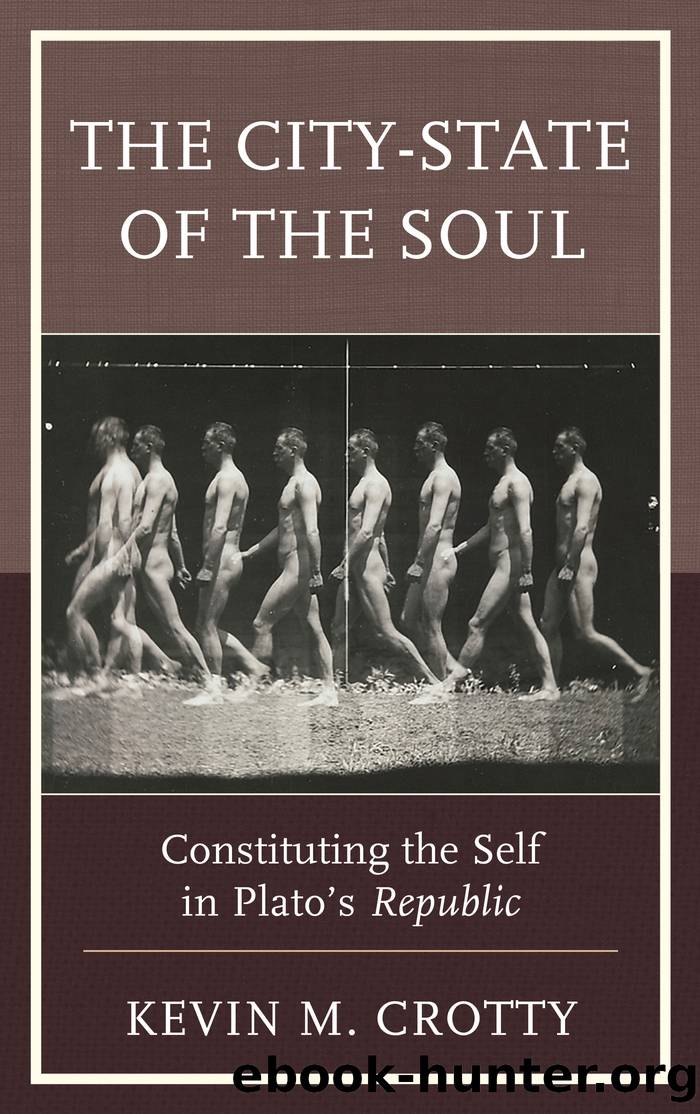The City-State of the Soul by Crotty Kevin;

Author:Crotty, Kevin;
Language: eng
Format: epub
Tags: undefined
Publisher: Lexington Books
Published: 2012-08-15T00:00:00+00:00
The Law Requiring Philosophers to Rule
Nonetheless, the philosopher needs to be compelled by law to take up the burdens of governanceâa point Socrates stresses.[30] As we have seen, there is a genuine problem here that needs to be cleared up. But I think that the scholarly discussion has been misleading in the way that it uncritically assumes a particular view of lawâviz., law as a body of coercive commands. If you understand law this way, then, naturally, it looks like an abridgment of human freedom. In our particular case, the law requiring philosophers to rule seems to compromise their happiness. A law, understood as a coercive command, may be just and, therefore, entitled to obedience. But this way of thinking about law leaves justice looking like an irksome obligation. But that, of course, is what Socrates is trying to show that justice is not.
In fact, Socrates has shown a better way to think about law, as a tool to shape community. Law is not primarily or even necessarily a constraint on greedy impulses, even if it must function that way in imperfect societies. Nor is it, as Thrasymachus had urged, a way for rulers to entrench themselves in power and exploit their subjects. Rather, it, too, is a creative toolâa potent force in bringing about the kind of people that the city requires if it is to flourish.[31] It enables people to achieve what they wantâa mutually advantageous life together in a stable and peaceful community[32]âbut which their native qualities might make difficult to achieve. The laws are like parents: they spawn the citizens. The source of their authority is the same as the source of parentsâ authority: to them, we owe our characters (see Crito 50dâe; cf. Rep. 7.520b1âc1; 537e1â539a7). Law, in short, does the work of eros, by binding the various parts of the city together into one (7.519e1â520a4).
If we understand law this wayâas a way of shaping communitiesâthen how does the law obligating philosophers to rule look? We notice, preliminarily, that the very need to coerceâto compel philosophers to ruleâis part of what makes them good rulers (Rep. 7.520d2â5). Philosophers must be lovers of the city, but not at all âlovers of rulingâ (á¼ÏαÏÏá½°Ï Ïοῦ á¼ÏÏειν, 521b4). Paradoxically, the philosopherâs reluctance to rule is part of her qualifications for holding sovereign power in the city. The philosopher who has relished contemplating the Forms of Justice, Courage, Wisdom and Sophrosune will find the stresses of political office arduous and distracting. But that is a good thing: as Socrates observes, âIf you can find something better than ruling for those who will rule, then you have the possibility of a well governed cityâ (Rep. 7.520e4â521a2).
Next, without a law compelling philosophers to rule, it might seem that philosophers are impermissibly meddling in othersâ affairs, in violation of the basic principle of justice, which prohibits meddlesomeness (or polupragmosune). After all, Socrates anticipates that the idea of a philosopher-ruler will shock people. Rule by philosophers does not seem like a ânaturalâ idea, nor is its wisdom immediately obvious.
Download
This site does not store any files on its server. We only index and link to content provided by other sites. Please contact the content providers to delete copyright contents if any and email us, we'll remove relevant links or contents immediately.
The remains of the day by Kazuo Ishiguro(8338)
Tools of Titans by Timothy Ferriss(7737)
Giovanni's Room by James Baldwin(6749)
The Black Swan by Nassim Nicholas Taleb(6721)
Inner Engineering: A Yogi's Guide to Joy by Sadhguru(6405)
The Way of Zen by Alan W. Watts(6254)
Asking the Right Questions: A Guide to Critical Thinking by M. Neil Browne & Stuart M. Keeley(5320)
The Power of Now: A Guide to Spiritual Enlightenment by Eckhart Tolle(5291)
The Six Wives Of Henry VIII (WOMEN IN HISTORY) by Fraser Antonia(5197)
Astrophysics for People in a Hurry by Neil DeGrasse Tyson(4973)
12 Rules for Life by Jordan B. Peterson(4138)
Housekeeping by Marilynne Robinson(4016)
The Ethical Slut by Janet W. Hardy(4008)
Skin in the Game by Nassim Nicholas Taleb(3941)
Double Down (Diary of a Wimpy Kid Book 11) by Jeff Kinney(3874)
Ikigai by Héctor García & Francesc Miralles(3830)
The Art of Happiness by The Dalai Lama(3817)
Skin in the Game: Hidden Asymmetries in Daily Life by Nassim Nicholas Taleb(3695)
Walking by Henry David Thoreau(3658)
